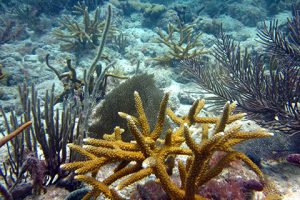As fragile corals return to the sea
Florida leadership passes on the Biden Administration’s solar panels for low-income families, FSU researchers look for climate solutions right beneath our feet, and scientists return over 5,000 refugee corals back into the ocean. All in this week’s Environmental and Engineering Digest.
 Solar Panel Shakeup: The Biden Administration announced a solar panel initiative earlier this year, known as the “Solar for All” competition, a part of its multifaceted approach to try to overhaul U.S. infrastructure and power grids toward a more sustainable tomorrow. The $7 billion prize pool will be split among 60 state and local governments and nonprofit groups, with awards ranging from $25 million to $400 million, hoping to reduce utility costs of low income communities by 20% over the next several years. However, six states, including Florida, did not apply for the initiative, leaving many confused and outraged over the money left on the table. Those states have until August 2024 to apply. In the meantime, a coalition of nonprofit organizations is expected to apply to bring the funding to Florida, according to the Sun-Sentinel.
Solar Panel Shakeup: The Biden Administration announced a solar panel initiative earlier this year, known as the “Solar for All” competition, a part of its multifaceted approach to try to overhaul U.S. infrastructure and power grids toward a more sustainable tomorrow. The $7 billion prize pool will be split among 60 state and local governments and nonprofit groups, with awards ranging from $25 million to $400 million, hoping to reduce utility costs of low income communities by 20% over the next several years. However, six states, including Florida, did not apply for the initiative, leaving many confused and outraged over the money left on the table. Those states have until August 2024 to apply. In the meantime, a coalition of nonprofit organizations is expected to apply to bring the funding to Florida, according to the Sun-Sentinel.

Hot springs are heated by geothermal heat. Courtesy, Brocken Inaglory, CC BY-SA 3.0, via Wikimedia Commons
Right Beneath Our Feet: Mathematicians at Florida State University are leading the charge against climate change under the U.S Department of Energy’s Energy Earthshots initiative – learning and building computational models for geothermal energy, and its effectiveness storing excess carbon dioxide from the atmosphere deep underground. Associate Professors Feng Bao and Sanghyun Lee have been awarded a three-year $4.9 million grant to develop machine learning that will continually streamline the research and ongoing experimentation of geothermal energy, hoping to better understand the geomechanical and geochemical processes that churn beneath the Earth’s crust. The main problems encountered with geothermal energy have historically been because of the complexity of all the related natural systems and the uncertainty this causes in the data, but the team is hopeful their interdisciplinary nature and machine learning will combat many of these previous shortcomings. “This opportunity symbolizes the chance to create a substantial influence within the realm of computational mathematics in the field of subsurface energy systems,” Lee said, something that could hold the utmost environmental and societal impact in the near future.

Florida Coral. Courtesy, University of Miami Rosenstiel School
Coral Reintroduction: Scientists are finally able to return thousands of corals back to the water down in the Florida Keys, after record-setting high ocean temperatures this past summer put them in peril, as reported in our August 21, 2023 newsletter. Water temperatures have finally begun to fall back to normal levels. Heat surges threaten mass death of corals, as most temperatures above 85 °F will begin to kill zooxanthellae, the algae that provides nourishment and color to the corals. Director Cynthia Lewis and her team at the Keys Marine Laboratory can finally take a moment’s rest after the 4-month evacuation and reintroduction process, having returned 360 corals to the ocean this past week alone. The lab is operated by the University of South Florida and hosts saltwater tanks up to 1,000 gallons in volume – a number that had to triple rapidly to respond to the early heat flares this summer.
LMA Newsletter of 11-6-23

